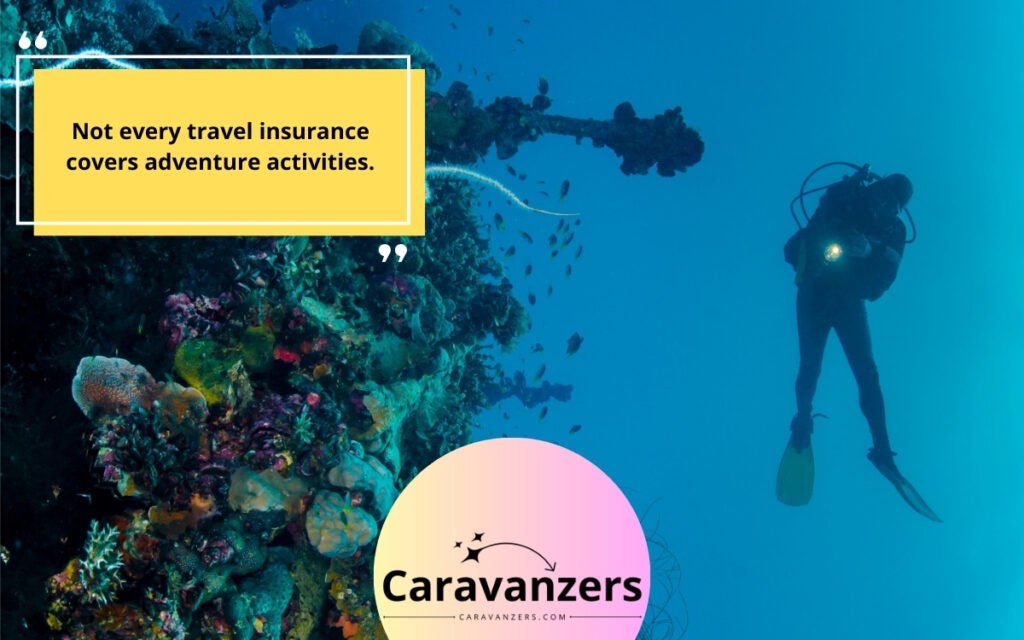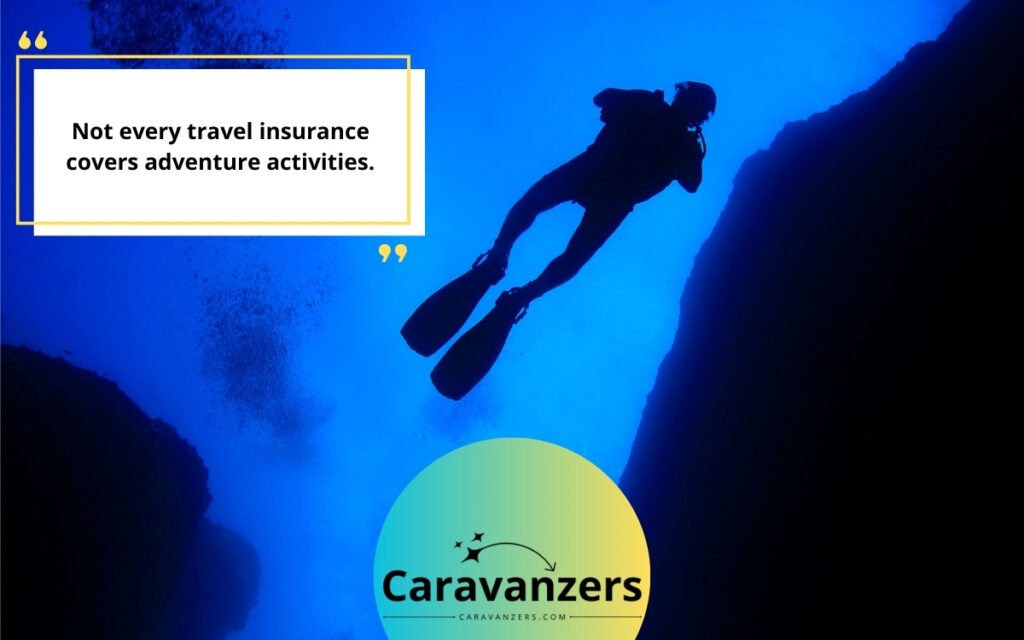
Dive travel insurance gives you a chance to experience diving in regions both near your home area and abroad, and this guide has the details.
I love diving, and I enjoy it whether it’s in my region or elsewhere, and it’s great to have insurance options.
So, in this guide, I will describe diving trips, as well as the different types of insurance available.
I will also actually recommend a particular company, giving you a chance to go sign up today.
Let’s get get on with planning your diving trip!
Scuba Diving Trip Basics
Diving is a captivating activity that offers an exhilarating experience beneath the water’s surface.
From the serene depths of freediving to the adventurous explorations of cave and wreck diving, there are various types of diving that cater to different interests and skill levels.
Whether it’s wandering into the mysteries of underwater caves, marveling at marine life during night dives, or venturing beneath icy surfaces, each diving type presents its own unique challenges and rewards.
Meanwhile, diving trips can include a range of destinations, from local to international.
Local trips offer the convenience of exploring nearby dive sites, often within one’s own country.
National trips allow divers to venture further, exploring diverse marine ecosystems within their home country.
International trips open up a world of exotic and breathtaking dive destinations, offering a global underwater exploration experience.
Likewise, diving can be enjoyed in various group sizes.
Solo trips offer solitude and freedom, allowing divers to explore at their own pace.
Diving with a few people offers a close-knit experience, ideal for friends or families.
Large group dives create a social atmosphere, fostering camaraderie and shared underwater adventures.
So, as you can see, diving is a cool experience, and trips can be very diverse.
The rest of this guide will focus on how to make sure your diving trip is safe and protected.
Travel Insurance vs Diving Insurance

Travel insurance is designed to protect trips by providing coverage for unforeseen events and expenses.
However, diving is generally considered a risky or dangerous activity, and most standard travel insurance policies do not automatically include coverage for diving-related incidents.
Diving carries inherent risks, such as decompression sickness or accidents underwater, which may require specialized medical attention or emergency evacuation.
To ensure adequate protection, divers should seek specialized diving insurance or add-on coverage to their travel insurance policy that specifically includes diving activities.
This way, they can have peace of mind knowing that they are financially safe against potential diving-related risks and emergencies.
Many years ago, I took a diving trip before I really understood the importance of travel insurance.
I was already on my trip when one of my diving buddies I met at the destination told me that I needed to call my travel insurance and ask them to let me know if I had that coverage.
Unfortunately, my diving buddy was right.
The insurance company confirmed that I did not have diving coverage and that it would cost almost double to get one.
Needless to say, I learned to make sure my trips were protected.
Travel Insurance Covering Scuba Diving
Many travel insurance companies offer dive travel insurance with worldwide coverage.
Generally speaking, these companies provide affordable plans that cover diving, nondiving, and named water sports accidents.
The insurance will typically pay 100% of eligible accident medical expenses up to a certain amount.
For example, some companies will cover up to $1 million.
Although the industry tends to be rather ageist, many are available for divers age 70 and over in many destinations.
In case of emergency, diving insurance provides assistance and covers significant expenses for various dive-related incidents.
Travelex Insurance, for example, offers an Adventure Sports upgrade for their Travel Select plan, providing additional coverage for activities like ziplining, skydiving, and mountain climbing.
While their basic plans cover some sports and adventures, the upgrade ensures you’re adequately protected for riskier activities.
They also offer other customization options, and you can get a free quote online for the Travel Select plan with the Adventure Sports upgrade.
Travelex’s Travel Basic and Travel Select plans to provide coverage for scuba diving, but only up to 60 feet or 18 meters.
However, for those of you like me who want more extreme adventures not automatically covered, I would definitely recommend that you consider purchasing the Adventure Sports upgrade for additional protection.
Domestic Diving Insurance

From my own experience, the level of travel insurance coverage can vary depending on whether it is a local or national diving activity.
Local diving, which takes place within the same region or locality, may be covered by regular health insurance policies to some extent.
This is certainly the case for me in Minnesota, in the United States, where my local health insurance covers my diving adventures.
For example, there are over 50 diving spaces in Minnesota, and my health insurance covers all of them.
The only catch is that I have to follow Minnesota guidelines, which include the number of divers that can share a flag, etc.
However, national diving, which involves traveling to different parts of the country for diving, may not be covered under normal health insurance.
This is certainly the case with my insurance.
So, whenever I leave my healthcare network, I need to ensure that I purchase additional health insurance.
I have a good diving buddy up in Canada, and the situation is different for him.
His health insurance covers the entire country.
Likewise, I’m part of a diving group on Facebook, and some of the members are from the European Union region.
Their health insurances seem to work for them across the European Union.
So, diving accidents or injuries during national trips may require specialized diving insurance or additional coverage to ensure adequate protection.
It is crucial for divers to review their health insurance policies and consider obtaining diving-specific coverage for national diving trips to mitigate any potential financial risks associated with accidents or emergencies.
International Diving Insurance
When it comes to international diving, the cost and coverage of health insurance can vary depending on the location.
For divers visiting the United States, you really need to know things are very different here.
I learned this the hard way when I tried to get dive travel insurance for friends visiting from Australia.
We had a rude awakening and found out how the healthcare expenses in the US are generally higher in comparison to many other countries.
In the process of my research, I found out that there are several reasons why things are so expensive here.
For example, high administrative costs, expensive medical technology and drugs, extensive regulations, fragmented healthcare delivery systems, and the absence of price controls all result in a complex and costly healthcare ecosystem.
Therefore, health insurance plans may be more expensive for international divers visiting the US.
Additionally, it’s crucial for divers to thoroughly research and choose reputable insurance providers, as there are instances of fraudulent companies or misleading coverage in certain countries.
Double-checking the authenticity and reliability of insurance coverage is essential to ensure adequate protection against diving accidents or emergencies while diving internationally.
Final Thoughts
Dive travel insurance provides valuable coverage for divers exploring local and international waters.
Whether you’re diving near your home region or venturing abroad, having insurance options is essential for peace of mind.
This guide has provided detailed information on diving trips and the various insurance types available.
Additionally, I recommended a reputable insurance company, allowing you to easily sign up and secure coverage.
Start planning your diving trip with confidence and ensure you have the necessary insurance protection for a safe and enjoyable experience.
Enjoy your diving!
Tom Larson is a traveler who writes about the outdoors.
Follow us on Pinterest.

One Comment
Comments are closed.